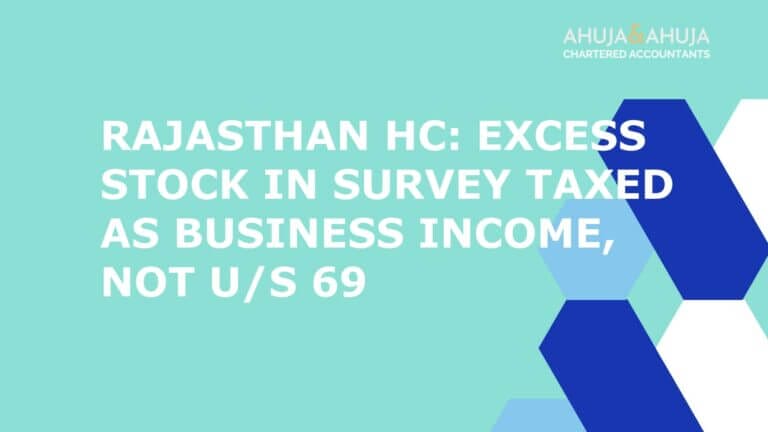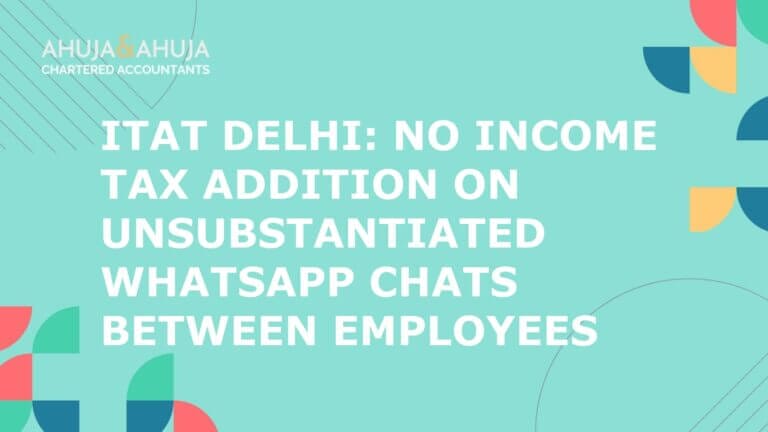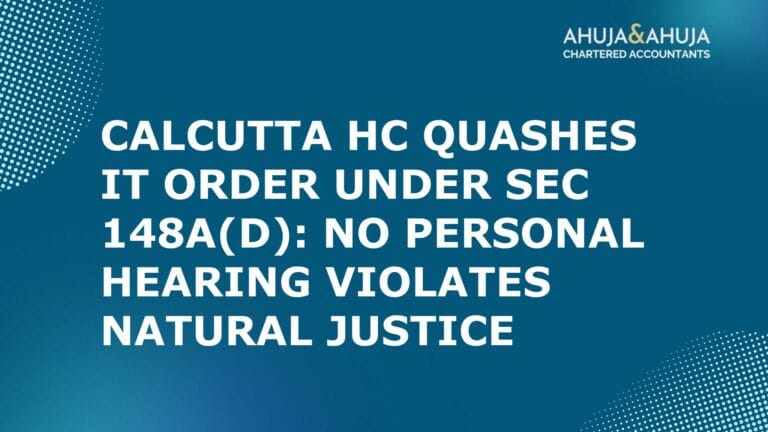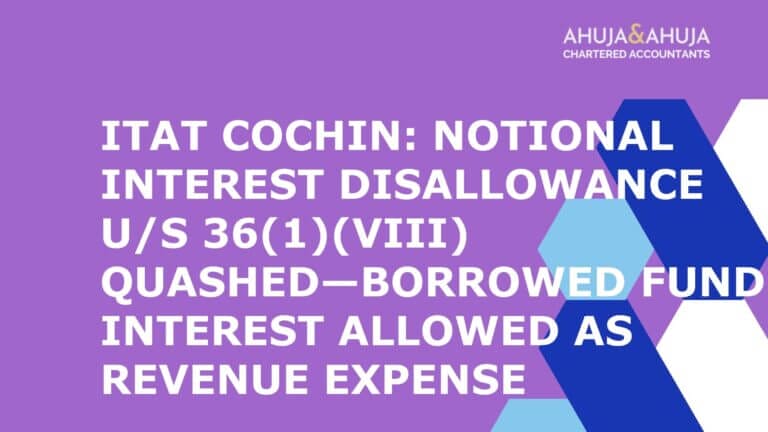ITAT Ahmedabad: 80G Registration Denied to Trust Due to Religious Objects in Deed
The Income Tax Appellate Tribunal (ITAT) Ahmedabad’s May 2024 decision in the case of OM Tapovan Charitable Trust has sent a clear message to the charitable sector: even a single religious object in your trust deed can cost you 80G registration, regardless of your actual activities. For CA professionals and trust administrators, this ruling is a crucial reminder that eligibility for donor tax benefits hinges not just on what a trust does, but on what its founding documents say.
This article unpacks the legal reasoning behind the ITAT’s denial, highlights the compliance pitfalls, and offers practical guidance for trusts and their advisors. We’ll address the most pressing questions practitioners face, from deed drafting to donor communication, and map out a compliance roadmap in light of this precedent.
Legal Foundations: 80G Registration, Charity vs. Religion, and The Deed
Section 80G: Why It Matters
Section 80G of the Income Tax Act is the gateway for charitable trusts to offer tax benefits to their donors. When a trust is registered under 80G, donations to it become eligible for deduction in the hands of the donor—making it a powerful tool for fundraising and public support. But this benefit comes with strict regulatory scrutiny, especially regarding the trust’s objectives.
What Does the Law Require?
To qualify for 80G registration, a trust must satisfy several conditions, notably:
- Section 80G(5)(ii): The institution must be constituted for charitable purposes only, and its rules must not allow funds to be used for non-charitable purposes.
- Section 80G(5)(iii): The trust’s objects must not be “expressed to be for the benefit of any particular religious community or caste.”
- Section 80G(5B): Allows up to 5% of receipts to be spent on religious activities, but only for trusts established solely for charitable purposes.
Why the Trust Deed Is Pivotal
The trust deed is the legal heart of any charitable institution. It sets out the trust’s objects—its “reason for being.” For 80G purposes, authorities scrutinise the deed to ensure that all stated objects are purely charitable, with no room for religious or caste-based benefit. Even if a trust’s day-to-day work is secular, the mere presence of a religious object in the deed can be fatal.
The importance of proper deed drafting and 80G and 12A registration services cannot be overstated for trusts wanting to secure these benefits.
The OM Tapovan Charitable Trust Case: A Snapshot
OM Tapovan Charitable Trust ran an ashram offering yoga, yagna (havan), and shibirs, and also engaged in charitable activities like running a charity kitchen and medical camps. The trust was already registered under section 12A (for charitable status), but when it applied for 80G registration, the Commissioner of Income Tax (Exemption) flagged several objects in its deed—such as “to carry out religious activity,” “maintenance of temple,” and “celebrate religious festival.” These explicit references to religious purposes became the crux of the dispute.
Trigger Points: Clauses That Attract Denial Under Section 80G(5)(iii)
What Does Section 80G(5)(iii) Actually Say?
This clause bars registration if the trust’s objects are “expressed to be for the benefit of any particular religious community or caste.” Over the years, courts have interpreted this to mean that even a general religious object—like maintaining a temple or celebrating religious festivals—can trigger denial, regardless of whether the trust is open to all communities.
Problematic Deed Language: What to Watch Out For
In OM Tapovan’s case, the following phrases in the trust deed were red flags:
- “To carry out religious activity”
- “To make and maintain temple”
- “To celebrate religious festival”
Such language, even if included alongside a long list of charitable objects, is enough to disqualify a trust from 80G registration. The law does not permit a “mixed bag” approach—if any object is religious, the entire application is tainted.
Drafting Guidance: Avoiding the Pitfalls
For CAs and trust drafters, the lesson is clear: avoid any object clause that refers to religious activities, temple construction, festival celebration, or similar terms. Even if the trust’s main work is charitable, the deed must not leave the door open for religious purposes.
For expert drafting assistance or amendments, consider consulting professionals offering NGO-related services.
Distinguishing “Charitable” and “Religious” Purposes: Legal and Practical Insights
Where Is the Line Drawn?
Indian tax law defines “charitable purpose” to include relief of the poor, education, medical relief, and advancement of any other object of general public utility. “Religious purpose,” on the other hand, refers to activities that promote or support a particular faith, worship, or religious practice.
How Did the ITAT Apply This Distinction?
In OM Tapovan’s case, the ITAT acknowledged that running an ashram, conducting yoga camps, and providing medical aid are charitable. However, objects like performing yagna, maintaining a temple, or celebrating religious festivals are inherently religious. The presence of both types of objects in the deed was enough to deny 80G registration.
Practical Examples for Clarity
- Purely Educational Trust: Eligible for 80G, provided no religious object is stated.
- Trust with Occasional Havan: If the deed allows religious activities, 80G is at risk—even if such activities are rare.
- Trust Mandating Temple Construction: Automatically disqualified from 80G, regardless of other charitable work.
Deed Objects vs. Actual Expenditure: What Really Matters?
Intent Over Practice: The Legal Position
A common misconception is that as long as a trust doesn’t actually spend money on religious activities, it should qualify for 80G. The ITAT ruling makes it clear: what matters is the intent as expressed in the deed, not just the trust’s actual expenditure.
The Core Holding
Even if a trust can prove that it has never spent a rupee on religious activities, the mere presence of a religious object in its founding document is enough for denial. This “substance-over-form” principle is reversed here—the form (deed) trumps the substance (actual activity).
Implications for Existing Trusts
Many older trusts have “legacy” clauses that mention religious activities, often as a matter of tradition. These clauses now pose a real risk to 80G eligibility, even if the trust’s operations are entirely secular.
Section 80G(5B): Scope & Limitations – Why the Assessee Failed
The 5% Incidental Religious Expenditure Rule—Often Misunderstood
Section 80G(5B) is sometimes seen as a “get out of jail free” card for trusts with minor religious activities. In reality, it’s much narrower. This provision allows a trust, established solely for charitable purposes, to spend up to 5% of its total income on religious activities in any given year—without losing 80G eligibility. The catch? The trust’s objects must be exclusively charitable. If the deed itself contains any religious object, this 5% leeway is irrelevant.
Why OM Tapovan Couldn’t Rely on 80G(5B)
In OM Tapovan’s case, the trust argued that it had not actually spent anything on religious activities, so the 5% rule should protect it. The ITAT disagreed. The panel clarified that 80G(5B) only softens the rule in sub-clause (ii) (incidental religious expenditure), not sub-clause (iii) (religious objects in the deed). If the trust’s founding document allows for religious activities, the 5% rule simply does not apply.
Case Law Reference: Yug Chetna Parmarth Trust
The ITAT drew support from the Yug Chetna Parmarth Trust decision (44 taxmann.com 446), which held that the 5% rule is only for trusts “established for charitable purpose only.” If the trust’s objects are mixed, the benefit is lost at the threshold.
For more on litigation and assessment matters, see our income tax litigation services.
12A Registration vs. 80G: Bridging the Compliance Gap
Why 12A Is Not Enough
Many trusts believe that once they have 12A registration (which confers charitable status and income tax exemption), 80G approval is a formality. This is a dangerous misconception. Section 12A registration is available to trusts with charitable and religious objects, as long as the main purpose is not religious. But 80G is stricter: any religious object in the deed is a deal-breaker.
Dual Compliance Is Essential
For trusts seeking to offer donor tax benefits, both 12A and 80G compliance are required. The criteria are not identical. CAs must ensure that the trust deed is “clean” for 80G, even if it already passed muster for 12A.
Detailed help on 80G and 12A registration can guide trusts through these distinctions.
Compliance Roadmap: Steps for Trusts with Mixed Objects
How to Rectify and Restructure
If a trust’s deed contains religious objects, all is not lost. The trust can:
- Amend the Deed: Follow the procedure laid out in the original deed and relevant state trust laws to remove religious objects.
- Document the Change: Pass a board resolution, execute a supplementary deed, and communicate the amendment to the relevant authorities (Charity Commissioner, Registrar, etc.).
- Reapply for 80G: Once the deed is amended and the change is registered, the trust can reapply for 80G registration.
Best Practices for Future-Proofing
- Ensure all objects are exclusively charitable.
- Avoid ambiguous or “catch-all” language that could be interpreted as religious.
- Keep a clear document trail of all amendments and board decisions.
For procedural assistance, including trust deed amendments, see our NGO services.
Professional Advisory: Drafting or Amending Trust Deeds for 80G Eligibility
Key Principles for CAs and Advisors
- No Religious Language: Avoid terms like “temple,” “yagna,” “festival,” “worship,” or “religious activity.”
- Charitable Focus: Objects should focus on education, medical relief, poverty alleviation, and other public utility purposes.
- Model Clause Example:
“To provide medical relief, education, and support to the poor and needy, irrespective of caste, creed, or religion.”
Ongoing Review and Compliance Audits
- Regularly review the trust deed and activities to ensure continued compliance.
- Advise clients to conduct periodic legal audits, especially before applying for 80G or accepting large donations.
If you are located near Chandigarh or Amritsar, our local CA experts provide specialised advisory on trust compliance and tax registrations.
Minor Religious Activities: Thresholds, Exceptions, and Risk Management
Incidental vs. Core Activity—Where’s the Line?
If a trust’s objects are purely charitable, but it occasionally incurs minor religious expenditure (e.g., a small puja at an event), the 5% rule under 80G(5B) may apply. However, this is only permissible if the deed itself is free of religious objects.
How to Document and Monitor
- Maintain clear records of all expenditures.
- Ensure religious spending never exceeds 5% of total income.
- If in doubt, seek a legal opinion or advance ruling.
Impact on Donors: Tax-Deductibility and Attractiveness
Consequences of 80G Denial
Without 80G registration, donors cannot claim tax deductions for their contributions. This can significantly reduce a trust’s ability to attract funding, especially from corporates and high-net-worth individuals.
Communicating Compliance to Donors
- Be transparent about 80G status in all fundraising materials.
- Provide donors with up-to-date certificates and disclosures.
Maintaining Donor Confidence
- Issue periodic compliance certificates.
- Publish annual reports highlighting 80G status and regulatory compliance.
Legal Recourse and Precedents: Challenge and Alternative Interpretations
Appellate Options
If denied 80G registration, a trust can appeal to the High Court and, if necessary, the Supreme Court. However, unless there is a clear legal error or a change in law, the current judicial trend is strict.
Precedents and Divergent Views
While some earlier decisions were more lenient, the present approach—especially post-amendment—is uncompromising. Unless the legislature amends the law, trusts must comply with the current interpretation.
For recent relevant judgements on tax assessments, see our blog post on Telangana HC quashing Section 148A/148 proceedings.
Key Takeaways: For CA Professionals & Trust Administrators
80G Compliance Checklist
- Scrutinise the trust deed for any religious objects.
- Amend the deed if necessary, following due process.
- Ensure all activities and expenditures align with charitable purposes.
- Maintain robust documentation and periodic compliance reviews.
Professional Responsibilities
CAs play a pivotal role in:
- Educating clients about the distinction between 12A and 80G.
- Drafting and vetting trust deeds.
- Guiding on compliance and rectification steps.
Forward-Looking Guidance
Build trust structures that are robust, transparent, and future-proof. Regularly review legal developments and update documentation as needed.
Conclusion
The ITAT Ahmedabad ruling is a wake-up call for the charitable sector. For 80G eligibility, the trust deed must be surgically clean—no religious objects, no ambiguity. CAs and trust administrators must act proactively: review, amend, and future-proof trust documents to safeguard both compliance and donor confidence.
If you need a sample compliant object clause, a deed review, or have a specific scenario in mind, feel free to ask. Staying ahead on compliance is the best way to ensure your trust’s social impact—and your donors’ goodwill—remain secure.
Disclaimer
The materials provided herein are solely for educational and informational purposes. No attorney/professional-client relationship is created when you access or use the site or the materials. The information presented on this site does not constitute legal or professional advice and should not be relied upon for such purposes or used as a substitute for professional or legal advice.







